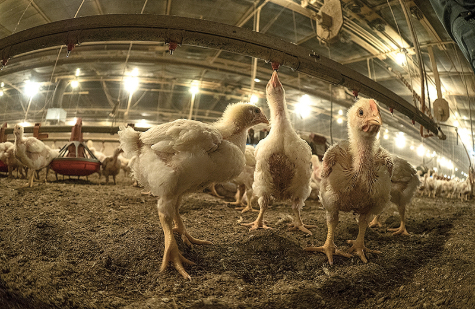When Maryland vastly expanded the number of farms with large numbers of animals that would require stormwater permits, it offered a grace period on fees to encourage farmers to enroll.
That was in 2009. After 10 years and two governors — one Democrat, one Republican — the Maryland Department of the Environment has continued to waive the annual charge, allowing farmers to avoid at least $4 million in payments over the span.
A state law passed last spring bars MDE from waiving the fees any longer. How much farmers will pay, though, depends on the outcome of a fight that is pitting a key state lawmaker and the Maryland Attorney General’s Office against the MDE.
Lawmakers left it up to MDE to decide how much to charge. The agency has proposed requiring farms to pay a fee once every five years, which is the length of the permit.
Fees can range from $60 to $800 depending on the size of the operation.
Those proposed fees are half the amount currently on the books and would be assessed just once, instead of each year of the permit’s five-year life. They would still bring in revenue — just not as much as advocates had hoped. It works out to about $425,000 less per year going to MDE compared with the totals called for — but not collected — under the existing law.
State Sen. Paul Pinsky (D-Prince George’s County), one of the new law’s main sponsors, accuses MDE of intentionally undermining the measure’s intent: to ensure the agency has the resources it needs to enforce environmental protections.
“The fees define the ability to provide oversight and enforcement,” Pinsky said.
The Attorney General’s Office has sided with Pinsky. In an Oct. 22 letter, Assistant Attorney General Sandra Benson Brantley criticized MDE’s plan to fill the program’s funding gap with other revenue sources. She pointed to a separate statute that requires the agency to calculate fees so that they “cover the cost of the permit procedure.”
The permits relate to the largest type of animal farms, known as concentrated animal feeding operations, or CAFOs.
Following a change in federal CAFO regulations in 2008, Maryland updated its regulatory program to cover more smaller operations than previously had been affected by the rules, including poultry operations with as few as 37,500 chickens.
As a result, the number of regulated animal feeding operations grew from approximately a dozen to more than 500.
The change had a particularly large impact on the Eastern Shore, where hundreds of broiler chicken farms began receiving higher scrutiny for the way they handle polluted runoff.
For several years, environmental groups have criticized MDE, which oversees the CAFO program, for waiving the permit fees. “We all must pay our fair share in order to fund the agencies responsible for oversight and enforcement of the laws that protect us,” said Kathy Phillips, executive director of the Assateague Coastal Trust, which lobbied extensively for this year’s changes.
Starting to collect fees offers “an opportunity to increase the funds to ramp up effective oversight,” said Pinsky, chair of the Senate’s Education, Health and Environmental Affairs Committee. During the 2018 fiscal year, the number of inspections, spot checks and audits conducted by the CAFO program dropped 35% while enforcement actions were down 67%, according to MDE records.
Agency officials blamed the decrease in enforcement partly on an “increased emphasis on inspecting new [CAFO] construction.”
Meanwhile, Holly Porter, head of a group representing the region’s poultry producers, said she interprets the decline in enforcement actions as a sign that farmers are meeting their environmental obligations.
She added that her group, the Delmarva Poultry Industry, supports the fee structure changes despite reservations that it may put Maryland chicken growers at a competitive disadvantage with their peers in Delaware and Virginia.
MDE Secretary Ben Grumbles said the proposed fees conform with the law while providing the resources to continue what he called “one of the best programs of its type in the Chesapeake Bay region.”
He noted that the program receives funding from several sources, including the Maryland Clean Water Fund and a federal grant directed at permitting and monitoring CAFOs.
Grumbles said that Maryland was the first state in the region to win federal approval for an expanded regulatory program covering for animal operations. “It has been highly successful for 10 years now, operating under a budget approved every year by Maryland’s General Assembly,” Grumbles said. ”We look forward to working with all citizens, stakeholders and policymakers to ensure effective implementation of a renewed permit and continued environmental progress.”
Pinsky’s law, which went into effect Oct. 1, dealt with more than CAFO fees. Among other things, it imposes new reporting requirements for animal manure transported as fertilizer to other farms and reinstates regular water-quality monitoring by the Department of Natural Resources at nine sites on the Lower Shore.
MDE is taking public comment on the newly proposed stormwater permit until Dec. 27. The new regulations could go into effect early next year.
By Jeremy Cox



Henry Holloway says
Senator Pinsky would prefer that any farm of the size necessary to be profitable leave Maryland. I have had personal experience with Senator Pinsky and he is no friend of agriculture and has no interest in learning about agriculture. Senator Pinsky has no respect for the farm community and believes all farms are polluters and should be heavily regulated. One of the best things that could happen to Maryland Agriculture is to have Senator Pinsky voted out of office. Senator Pinsky will never understand that Maryland Farmers are active environmentalists, not environmental activists.